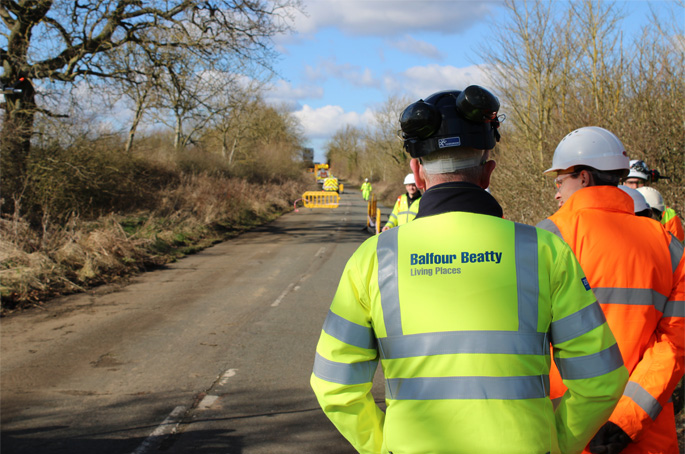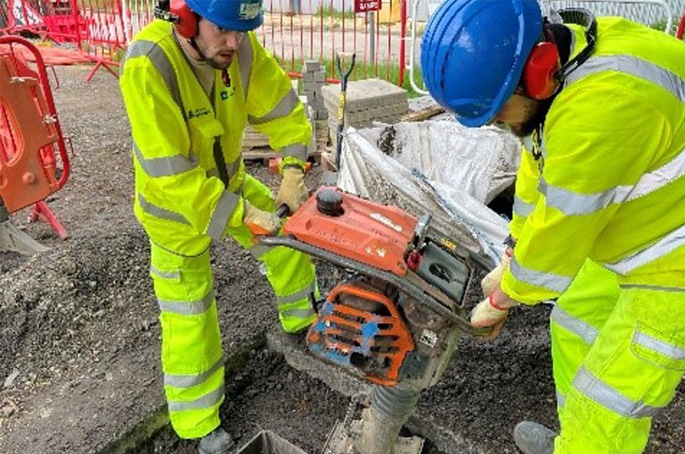Phil Clifton (pictured) is managing director of Balfour Beatty's highways business. He talks to Dominic Browne about building a digital-enabled offering for the modern market.

Balfour Beatty's roads business is booming. In Highways' latest contract league table it is currently lying in third place with 20 contracts and some £552.2m on the order books for the year to June.
As well its local maintenance contracts, its portfolio includes major partnership projects such as Highways England's flagship A14 improvement scheme, the M25 through membership of Connect Plus Services, and the M4 and M6 smart motorways with VINCI.
Having announced a few years back that it wanted to move away from ‘holes and poles', at least in its local authority business, and would be setting out its new high value stall somewhere up the road where interested clients could find it, Balfour Beatty is starting to reap the benefits of a new and improved digital culture, still perhaps in its infancy but undoubtedly its future.
These days such ambition may not be radical but its results certainly will be. In a challenging climate, highways companies are looking to raise profit margins and strengthen balance sheets – meaning some of the more go-alone, bread and butter forms of working are becoming less attractive, but also that the difficult process of change is made even harder by the struggle to invest and move away from work that keeps the pot boiling.
The prize the big players seek is a profit boost that coincides with skills, safety and productivity gaps being narrowed or removed through fast tracking digital, data and connected solutions.
For instance one key ambition from Balfour Beatty, which chimes with the corporate message coming from Highways England chief executive Jim O'Sullivan, is the removal of work on site.
Balfour Beatty has committed to reducing the amount of work undertaken on site by 25% by 2025, using among other things more modular building. The ambition was set out in a report from the company last year which cited the 2012 Construction, Building Services Engineering and Planning: Sector Skills Assessment, to suggest only 12% of construction involves offsite methods.
If roughly doubling the amount of offsite work in almost a generation seems modest, one has to consider how slow the project timelines are to get an idea of why the battleship is so hard to turn.
As group chief executive Leo Quinn wrote in his foreword to the 25% 2025 report: ‘From customers' needs through architects' designs to final completion, many projects run for as much as 5-10 years. Competition is so keen and margins often so tight that "breaking the mold" literally does not enter the equation.'
While Balfour Beatty maybe changing the maths on this issue, it accepts that the sector around it also needs to move forward as one ecosystem.
The benefits are obvious – enhanced health, safety and well-being; productivity gains; reduced logistics costs; quality assured projects with reduced onsite rework; greater certainty of programme delivery; shorter overall construction programmes and a standardised production mind-set making everything easier to build.
Of course in moving with the times you can add lower carbon use to that list too. Mr Clifton argues that highways is years behind other industries and is only just starting to catch up.
The smart strategy – both meanings intended – of Balfour Beatty is based around three aspects, which also seem to represent three overlapping stages in the delivery process.
‘Within our digital strategy there are three key workstreams; digital rehearsal, project controls and smart infrastructure,' Mr Clifton says.
‘The workstreams will be evolved through the three maturity steps of our digital journey; consistent, efficient and predictable. Our first and most important phase is the consistent phase, we place process re-engineering as the corner stone of the digital transformation in order to deliver value into the business.'
Digital rehearsal
‘The digital rehearsal is around building a digital model of what we are going to build and maintain so we get to see potential clashes early on between different partners working on and involved with the infrastructure. We can see interactions on infrastructure and get to iron out all this problems so when we do get to the site it will be a lot smoother.'
He points out that creating digital twins, as Highways England has done with the strategic road network, is not only to design and develop the work, but you also have ‘one truth that we take through the whole life of the asset – making one source of accurate data for the future'.
He adds this model will ‘become the norm… we are starting to have more and more projects going forward building in this foundation'.
As highlighted, Mr Clifton says the digital modelling does not just cover the design itself but the physical interaction of workers and users in the environment.
‘For our work on the M4, we have a simulator for a digger and you use that model simulation piece moving around the site.'
Mr Clifton says on the M4 smart motorway scheme, Balfour Beatty has used augmented reality, and created surrounding visions of the project from ‘helicopter views above' to plant on the ground.
Project control
All this feeds modelling and simulation feeds into what is broadly termed ‘project control' but is more romantically described with reference to the M4 control centre Balfour Beatty has established as being reminiscent of the ‘Star Trek bridge'.
It could also be described as localised Big Data or 360 degrees plant monitoring.
‘Project control is around how we effectively re-engineer our processes to use real-time data to make real-time decisions with a consistent coding system. That means that we can have data on where pieces of plant are for instance.
'We are doing a lot of work on telematics that allow us to monitor our fleet, including out earth moving fleet, to understand in real- time what's happening on the project and make decisions on output and productivity, for instance, to check for idling. That way we can generate requests without a big back office. We won't need monthly project performance – because there is it on the screen.'
In this way all managers, operators and logistics planners can work to the same real-time data set.
Smart infrastructure
Feeding into this is third piece of the puzzle. The smart infrastructure element uses connected infrastructure, the Internet of Things, sensors or other alert systems to enable the assets to ‘talk back' to the operators as Mr Clifton puts it.
‘This is about getting the gullies to tell us when they are full, or the pavements when they are ageing. We have a system at the Dartford Crossing that can recognise any abnormal loads, that can detect anything over-height, over-length and over-width and we have the ability to coral them and pull them out of the normal traffic flow. From about half a mile away the barriers come down and the vehicle is withdrawn.'
We are told that 5G will accelerate this process astronomically. It is easy to see how digital twins, simulating assets that talk to operators in real time can help make life easier for construction and maintenance. Not to mention real time telematics, plotting the course of soon-to be-autonomous vehicles – they are already trialling an autonomous dump truck on the A14 – around the site can help with delivery.
Crucially, one can see how the timeline for a project could be brought down, making Mr Quinn's mould much easier to break – and indeed with modular construction put back together again in a different way. A new contractual set-up might be necessary however, at the very least around data.
Mr Clifton tells Highways there is a lot of talk at the moment with Highways England about these aspirations can be contained with contracts of the future and ‘how you tie all this together' and how the sector might start working to create a central digital platform.
‘At the moment it's about getting around the table to talk, it's understanding the needs, what is the need to change; what is our vision?
‘At Balfour Beatty it's about making sure we are a digital deliverer, understanding what we need to change as a business. We need to become a digital enabled business. This is fundamentally changing the way we do business. We are changing our culture and we are changing at pace.'
The highways battleship is turning faster all the time. Suddenly breaking the mould might be part of the plan.
































